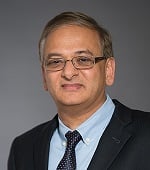 |
| Milind Deshpande |
Few biotechs loved to flirt with investors about the prospect of a buyout more than the hepatitis C specialist Achillion. Former CEO Michael Kishbauch made a habit of it. And not long after Milind Deshpande took the helm last fall, he quickly reignited talk of a sale, only to watch the stock tank days later when the FDA put its NS3/4A protease inhibitor, sovaprevir, on clinical hold.
This morning, a day after Merck ($MRK) stepped in to buy Idenix for a big premium and Achillion ($ACHN) enjoyed a 47% spike in its share price, the biotech is prolonging its return to the spotlight with the news that the clinical hold has been lifted. Another program, for the uridine-analog nucleotide polymerase inhibitor ACH-3422, began dosing in a study. And Achillion's once battered shares are up another 36% Tuesday morning in premarket trading.
Deshpande carefully laid out his hep C products in the shop window on Tuesday, enjoying the market's renewed attention to the race to assemble double and triple drug cocktails that can swiftly wipe out the virus in all genotypes.
Gilead ($GILD) paid the mother of all premiums when it bought out Pharmasset for $11 billion, putting it on track to introduce the hep C drug Sovaldi in the biggest drug launch in industry history. But clinical setbacks at Bristol-Myers Squibb ($BMY) and the smaller biotechs like Idenix and Achillion put a chill on all the buyout rumors--until today. Now the focus in the market is on rivals to Sovaldi, which has stunned payers in the U.S. with its $84,000 price, and the new cocktails that will compete for a large and growing market. Gilead is following up its solo launch with a likely approval for a combo later this year, with AbbVie ($ABBV) close behind and a resurgent Merck looking to leapfrog ahead.
"We believe Achillion is uniquely positioned with clinical candidates in each of the nucleotide, NS5A and protease inhibitor categories needed to advance both dual and triple commercially competitive combination therapies that can treat the spectrum of patients with HCV," Deshpande said in a statement. "We remain focused on developing regimens utilizing ACH-3422 and ACH-3102, our second-generation Phase II NS5A inhibitor, and the second half of 2014 will feature multiple milestones in that program. Our HCV pipeline also provides the opportunity to add a NS3/4A protease inhibitor, such as sovaprevir or ACH-2684, in order to explore triple-direct acting antiviral regimens that can potentially shorten treatment durations to less than 8 weeks."
- here's the release